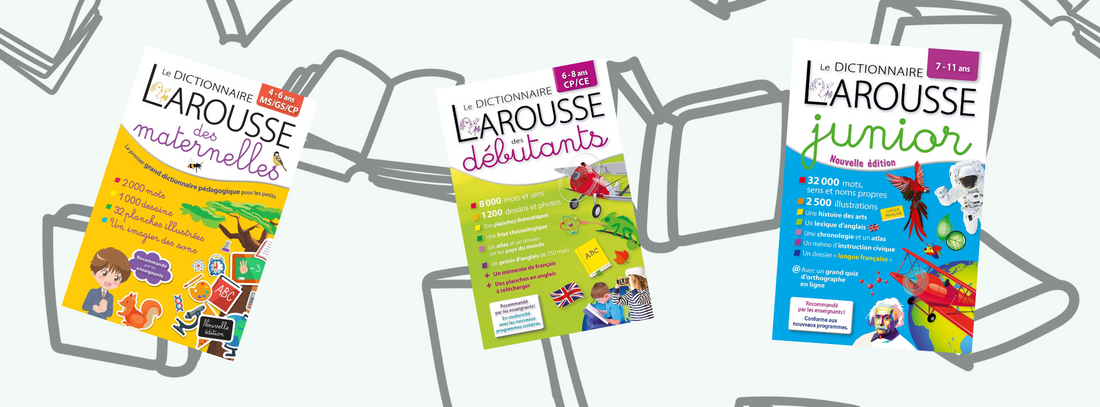
The Secret Superpower in Your French Home Library? A Dictionary.
Share
WE. LOVE. A. DICTIONARY.
Picture this: your third grader comes home excitedly telling you about *les escargots* they learned about in science class today. They want to write about snails for their journal, but keep getting stuck on words. What if, instead of pulling up Google Translate (again), they could reach for their own French dictionary - one specifically designed for their age and reading level? Score one for Team Not-Everything-Comes-From-a-Phone.
As parents raising bilingual kids, we spend a lot of time thinking about storybooks. But there's another category of French books that deserves just as much attention: reference books that help our kids become confident, independent language learners.
Why Age-Appropriate Dictionaries Matter
Here's something we've learned the hard way: handing a seven-year-old an adult French dictionary is like giving them a map without a compass. The definitions are too complex, there aren't enough visual aids, and frustration quickly sets in. But give that same child a dictionary designed for their age? Magic happens.
Age-appropriate French dictionaries offer:
- Definitions written in clear, simple language
- Visual support through illustrations and photos
- Thematic vocabulary groups (think: animals, sports, emotions)
- Examples that relate to their daily life
- Reading level-appropriate explanations
Building Independence and Confidence
Then when your child is ready to tackle a book by themselves? Having their own French dictionary can create similar moments of pride and independence. Instead of always asking for help, they can start finding answers on their own.
We've watched this unfold in our own home. Will started with a simple picture dictionary in CP (first grade), mostly using it to look at the illustrations. By CE1, he was regularly pulling out his "big kid dictionary" to look up words for his writing. Now he'll proudly announce "I know what that means - I looked it up in my dictionary!"
Choosing the Right Dictionary
Like books, dictionaries should grow with your child. Here's what we recommend at different stages:
Ages 4-6 (Maternelle/Kindergarten):
- Picture dictionaries with simple themes
- Heavy on illustrations
- Basic word-to-picture matching
- Focus on everyday vocabulary
Ages 6-8 (CP/CE1):
- First "real" dictionaries with simple definitions
- Clear visual support
- Thematic vocabulary sections
- Basic grammar guidance
- Pronunciation help
Ages 8-10 (CE2/CM1):
- More comprehensive word coverage
- Expanded definitions
- Introduction to synonyms and antonyms
- Grammar tips and conjugation tables
- Cross-references between related words
Ages 10+ (CM2 and up):
- Fuller vocabulary range
- More detailed definitions
- Expanded grammar support
- Etymology introductions
- Style and usage guidance
Making the Most of Your Dictionary
We encourage using the dictionary not just for homework, but for fun too:
- Word-of-the-day explorations
- Making themed word lists
- Playing simple word games
- Creating illustrated vocabulary cards
Beyond Just Definitions
Modern French children's dictionaries often include bonus features that make them even more valuable:
- Thematic vocabulary pages
- Simple English-French references
- Cultural information
- Maps and geographical references
- Basic grammar guides
- Spelling tips
Starting Your Dictionary Journey
Ready to add this secret weapon to your home French library? Start small - one age-appropriate dictionary that matches your child's current needs. Watch how they interact with it, and don't be surprised if they initially just flip through looking at pictures. That's part of the journey!
Remember: the goal isn't perfect French - it's giving our kids tools to become confident, independent language learners. Sometimes that journey starts with a simple picture dictionary and a curious child ready to explore.
*Looking to build your home French reference library? Our founding family presale launches February 20th, featuring carefully curated collections that include age-appropriate dictionaries. Join our waitlist for early access!*
